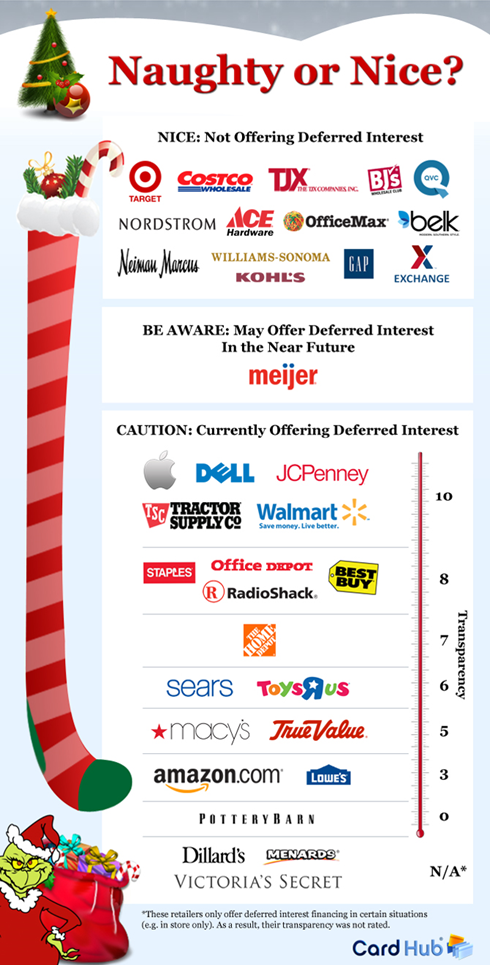Are Major Retailers Juicing For Better Holiday Sales?

Much has been made of the tepid 2013 holiday shopping season. Faced with a constrained calendar as well as expectations that consumer spending would decrease relative to 2012, 90 percent of companies have pre-announced negative earnings for the fourth quarter. It seems their fears have been realized, too, as stocks recently tumbled as hard numbers from the final three months of the retail calendar have emerged.
But are we reading too much into a single sector’s single-quarter performance?
There are a number of obvious caveats to fourth-quarter retail earnings, from the influence of external factors like weather and the calendar to the distortionary effects of price increases. However, there is another fundamental and often-overlooked reason as to why holiday sales figures could wind up distorting your perspective on the major players in retail.
It’s called deferred interest.
Roughly half of the major retailers that offer financing use this feature, according to a recent CardHub study, enabling them to advertise eye-catching 0 percent intro rates that are accompanied by a very costly catch. If you miss a single payment or fail to pay your full balance within the intro period, finance charges will retroactively apply to your entire original purchase amount, as if you’d been paying the full freight all along. To make matters worse, 41 percent of the retailers that use deferred interest are not transparent about doing so.
Since deferred interest can make an unsuspecting consumer’s financing costs more than 27 times more expensive, the companies that employ it have a great deal of consumer anger coming their way. That’s especially true during the holiday season, as U.S. consumers have racked up an average of $33.1 billion in credit card debt during the fourth quarter since 2009.
“It’s a disreputable practice if it’s not disclosed, and disclosed in a way that people who get the cards understand,” Edward Fox, director of the JCPenney Center for Retail Excellence at Southern Methodist University, recently told CardHub. “It’s not a good business practice to try to fool people.”
But folks who fall victim to fine-print caveats in retailer financing plans aren’t the only ones who stand to be fooled -- investors are at risk as well. Financing options, especially the most attractive and well-marketed among them, fuel holiday sales. That means fourth-quarter numbers are inherently flawed. The retailers that lend their names to deferred-interest credit cards and the banks that issue them may benefit from revenue inflated by unsustainable business practices, and those that don’t engage in such tactics could suffer as a result.
The infographic below gives you a sense of where major retailers fall on the deferred interest issue.

But there are a couple of other names to keep in mind as well. The deferred-interest credit card market is dominated by two issuers in particular: Citigroup Inc. [NYSE: C], which controls 31 percent of the market, and General Electric [GE], with 23 percent. Those companies could therefore see inflated transaction numbers and outstanding balances in the short term, but questions about the long-term viability of “gotcha pricing” still remain.
Deferred interest is certainly on the regulatory radar, and it was actually discussed as a potential addition to the CARD Act back in 2009. With that in mind, the Consumer Financial Protection Bureau (CFPB) continuing to search and destroy unscrupulous practices in the personal finance space and consumers growing savvier by the day, the writing is clearly on the wall for retailers and financial institutions that rely on deferred interest. Those who don’t see it are in for a rocky road, and they’ll bring unsuspecting investors right along with them.
Odysseas Papadimitriou is a former senior director in Capital One’s credit card division and the current CEO of the personal finance websites CardHub and WalletHub.
© Copyright IBTimes 2025. All rights reserved.






















